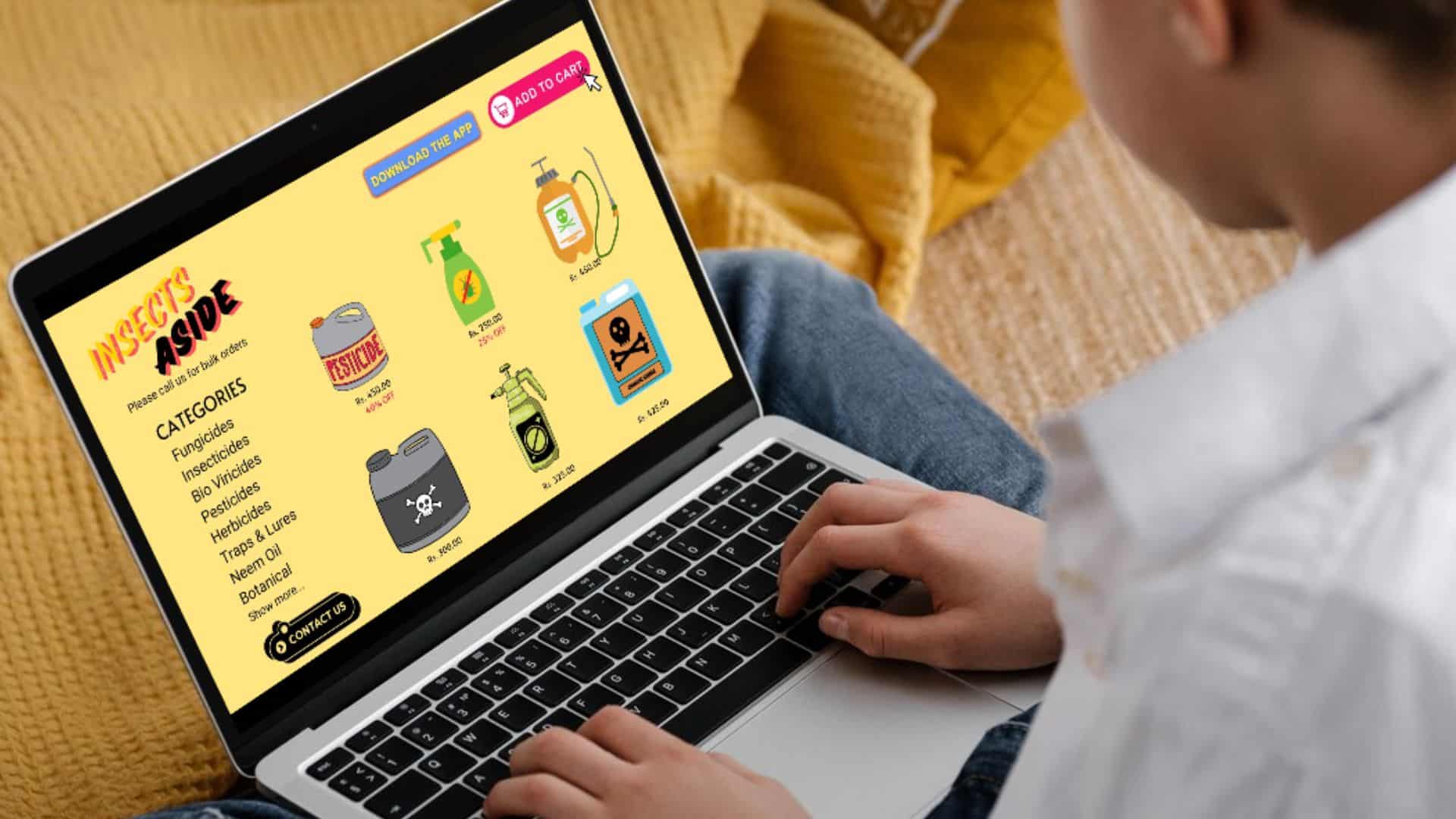Online sales of pesticides helps farmers in places far from suppliers. Can we keep them out of the hands of people who shouldn’t have them?

A person pulls up an online site for buying pesticides. (Illustration by News Decoder)
Warning: This article contains references to suicide and some people might find it disturbing.
In 2023, a team of doctors in New Delhi treated a young victim who had poisoned himself with a pesticide.
The 18-year old was a first-year medical student from Uttar Pradesh. During a period of significant emotional distress, Akshay ordered a dangerous pesticide from an e-commerce website with harmful intent. Despite a seven-day delay in its delivery, his mental health did not improve, and he ultimately ingested the substance. His death raised critical questions about the risks of selling hazardous chemicals online.
“As his condition deteriorated despite intensive medical care, one recurring discussion among the team was how easily such a lethal substance was available online,” said Dr. Karun Saathveeg, a final-year internal medicine resident who was part of the treating team. “The patient’s death affected us deeply.”
Saathveeg said that even as a medical student, the young man may not have fully grasped how dangerous the substance was. “We wondered if digital content with potential triggers comes with warnings, why do hazardous chemicals like this pesticide face fewer regulations online?”
The policy that governs the sales and distribution of hazardous agrochemicals in India is ancient. The acts that exist — the Insecticide Act of 1968 and the Insecticide Rules of 1971 — were written more than 50 years ago and don’t consider online sales and delivery.
Writing new rules for online sales
A new act, the Pesticide Management Act, was proposed in 2020 but it only deals with seller licensing. Meanwhile, India passed legislation in 2022 that allows the sale of pesticides and agrochemicals through e-commerce platforms.
India is not alone; many countries, including the Philippines and Indonesia, also permit online sales of these substances. Recognising this as a global problem, said Michael Eddleston, director of the Centre for Pesticide Suicide Prevention, the [World Health Organization] is developing guidelines for online sales of agrochemicals.
But whether the guidelines will balance business needs with public health concerns remains to be seen.
Online sales of pesticides helps out farmers who would otherwise lack access to them, said Dr. C. Chinnusamy, former professor of agronomy and weed science and dean of Tamil Nadu Agricultural University. “Demand and supply can sometimes be mismatched in low- and middle-income countries,” he said “Local dealers may not always have the necessary chemicals in stock, so making them available online improves access for farmers.”
But the ease of online purchasing also increases the risk of accidental or deliberate poisonings.
Online buyers are faceless.
Bhavani, a pesticide shop owner in Vellore, Tamil Nadu said that there’s a significant difference between purchasing pesticides in person and online.
“In local shops, we usually know our customers well — the crops they grow and the chemicals they typically buy,” Bhavani said. “We exercise caution if someone unfamiliar tries to purchase a particularly hazardous chemical. If we sense something suspicious, we might ask the person to come with a family member to make the purchase even. Online, that kind of personal judgment is lost.”
Eddleston said that this personal barrier is essential.
“In Sri Lanka, we’ve seen people seeking pesticides for self-harm often having to travel far outside their local areas and visit multiple shops to acquire them because shop owners exercised caution,” Eddleston said. “That inconvenience can act as a deterrent. Online purchases, however, remove those barriers.”
Doctors say that online sales of professional-grade agrochemicals also increase the possibility of accidental poisonings. People with home gardens and indoor plants can now buy the same potent pesticides that commercial farmers use even though there are safer alternatives designed for the home gardener.
Haphazard use of toxins
Dr. Kenneth Hartigan-Go, a medical toxicologist from the Philippines, cited one case where a woman purchased a powerful pesticide for termite control in her home. “She sprayed it herself without professional guidance and became ill due to exposure,” he said. “It’s unlikely she fully understood how to handle the chemical, but she had easy access to it, which is worrying.”
Some are pushing for stronger regulations that prohibit sales in small quantities — making them expensive to buy — or would limit sales to farmers and require identification.
Chinnusamy noted that most farmers in India have documents, such as farmland ownership records or Kisan credit cards, which can be used to identify them as farmers. “Requiring these documents before purchasing agrochemicals online could help,” he said. “It’s similar to how e-commerce sites selling prescription drugs require an online prescription before completing the sale.”
Eddleston said that when someone wants to poison themselves, forcing them to order a large supply could send signals to people who live with them.
Dr. Gamini Manuweera, a former registrar for pesticides in Sri Lanka, points out that there are risks to middlemen due to unsafe handling during shipping and transport as well.
Manuweera suggests that national regulatory bodies should start by categorizing agrochemicals based on their risk and passing legislation that ensures highly hazardous ones are sold only to certified users, such as farmers. Vasuki, whose 20-year-old daughter Pooja died after consuming a potent chemical she had bought online, can’t understand how easy it was for Pooja to get the chemical
“I had sleeping issues and would try to buy some pills for the same, and no pharmacy would sell them to me because I didn’t have a prescription,” Vasuka said. “How could my daughter have been able to buy this dangerous poison online?”
If you are having thoughts of suicide, go to the International Association for Suicide Prevention to find helplines and resources in your country.
Three questions to consider:
- Why do some countries allow the sale of dangerous pesticides online?
- Why should home gardeners not be able to buy agricultural chemicals?
- If you were in charge of a government agency in charge of regulating pesticides how would you make the system safer?

